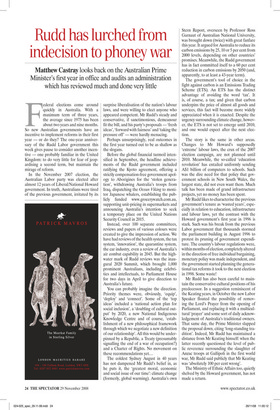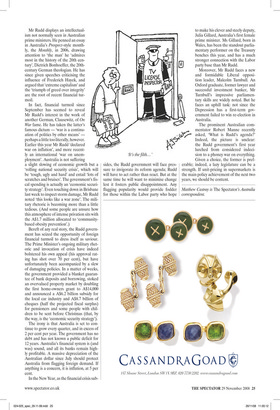Rudd has lurched from indecision to phoney war
Matthew Castray looks back on the Australian Prime Minister’s first year in office and audits an administration which has reviewed much and done very little Federal elections come around quickly in Australia. With a maximum term of three years, the average since 1975 has been about two years and nine months. So new Australian governments have an incentive to implement reforms in their first year — or do they? The one-year anniversary of the Rudd Labor government this week gives pause to consider another incentive — one probably familiar in the United Kingdom: to do very little for fear of jeopardising a second term, but maintain the mirage of reform.
In the November 2007 election, the Australian Labor party was elected after almost 12 years of Liberal/National Howard government. In truth, Australians were tired of the previous government, irritated by its surprise liberalisation of the nation’s labour laws, and were willing to elect anyone who appeared competent. Mr Rudd’s steady and conservative, if sanctimonious, demeanour fit the bill, and his party’s proposals — ‘fresh ideas’, ‘forward with fairness’ and ‘taking the pressure off’ — were hardly menacing.
Perhaps unsurprisingly, real outcomes in the first year turned out to be as shallow as the slogans.
Before the global financial turmoil intensified in September, the headline achievements of the Rudd government included ratifying the Kyoto agreement, offering a strictly compensation-free government apology to Aborigines for the ‘stolen generation’, withdrawing Australia’s troops from Iraq, dispatching the Ocean Viking to monitor Japanese whalers, establishing the publicly funded www.grocerywatch.com.au, supporting unit-pricing in supermarkets and announcing Australia’s intention to seek a temporary place on the United Nations Security Council in 2015.
Instead, over 100 separate committees, reviews and papers of various colours were created to give the impression of action. We have had reviews of the health system, the tax system, ‘innovation’, the quarantine system, the car industry, even a review of Australia’s air combat capability in 2045. But the highwater mark of Rudd reviews was the inaugural 2020 Summit, which brought 1,000 prominent Australians, including celebrities and intellectuals, to Parliament House for two days in April to give direction to Australia’s future.
You can probably imagine the direction. Priority themes were, obviously, ‘equip’, ‘deploy’ and ‘connect’. Some of the ‘top ideas’ included a ‘national action plan for social inclusion’, a ‘doubling of cultural output’ by 2020, a new National Indigenous Knowledge Centre and of course, ‘establishment of a new philosophical framework through which we negotiate a new definition of our relationship’. All this would be underpinned by a Republic, a Treaty (presumably signalling the end of a war of occupation?) and a Charter of Rights. No movement on these recommendations yet...
The coldest Sydney August in 40 years has not dampened Mr Rudd’s belief in, as he puts it, the ‘greatest moral, economic and social issue of our time’: climate change (formerly, global warming). Australia’s own Stern Report, overseen by Professor Ross Garnaut of Australian National University, was brought down (twice) with great fanfare this year. It argued for Australia to reduce its carbon emissions by 25, 10 or 5 per cent from 2000 levels, depending on other countries’ promises. Meanwhile, the Rudd government has in fact committed itself to a 60 per cent reduction in carbon emissions by 2050 (and, apparently, to at least a 43-year term).
The government’s tool of choice in the fight against carbon is an Emissions Trading Scheme (ETS). An ETS has the distinct advantage of avoiding the word ‘tax’. It is, of course, a tax; and given that carbon underpins the price of almost all goods and services, this fact will become more widely appreciated when it is enacted. Despite the urgency surrounding climate change, however, the ETS is not set to emerge until 2010, and one would expect after the next election.
The story is the same in other areas. Changes to Mr Howard’s supposedly ‘extreme’ labour laws, the crux of the 2007 election campaign, are not planned until 2010. Meanwhile, the so-called ‘education revolution’ has entailed uniformly sending A$1 billion of computers to schools. Such was the dire need for that policy that government schools in New South Wales, the largest state, did not even want them. Much talk has been made of grand infrastructure projects, yet no money has been spent.
Mr Rudd likes to characterise the previous government’s tenure as ‘wasted years’, especially in relation to education, infrastructure and labour laws, yet the contrast with the Howard government’s first year in 1996 is stark. Such was his break from the previous Labor government that thousands stormed the parliament building in August 1996 to protest its pruning of government expenditure. The country’s labour regulations were, within months of election, completely altered in the direction of free individual bargaining, monetary policy was made independent, and the government started planning the generational tax reforms it took to the next election in 1998. Some waste!
Mr Rudd has also been careful to maintain the conservative cultural positions of his predecessor. In a suggestion reminiscent of the Keating years, in October the new Labor Speaker floated the possibility of removing the Lord’s Prayer from the opening of Parliament, and replacing it with a multicultural ‘prayer’ and some sort of daily acknowledgement of Australia’s traditional owners. That same day, the Prime Minister slapped the proposal down, citing ‘long-standing tradition’. Indeed, Mr Rudd has maintained a distance from Mr Keating himself: when the latter recently questioned the level of public reverence surrounding the slaughter of Anzac troops at Gallipoli in the first world war, Mr Rudd said publicly that Mr Keating was ‘absolutely 100 per cent wrong’.
The Ministry of Ethnic Affairs too, quietly shelved by the Howard government, has not made a return. Mr Rudd displays an intellectualism not normally seen in Australian prime ministers. He penned an essay in Australia’s Prospect-style monthly, the Monthly, in 2006, drawing attention to ‘the man’ he ‘admires most in the history of the 20th century’, Dietrich Bonhoeffer, the 20thcentury German theologian. He has since given speeches criticising the influence of Frederich Hayek, and argued that ‘extreme capitalism’ and the ‘triumph of greed over integrity’ are the root of recent financial turmoil.
In fact, financial turmoil since September has seemed to reveal Mr Rudd’s interest in the work of another German, Clausewitz, of On War fame. He has taken the latter’s famous dictum — ‘war is a continuation of politics by other means’ — perhaps a little too literally, however. Earlier this year Mr Rudd ‘declared war on inflation’, and more recently an international ‘war on unemployment’. Australia is not suffering a slight slowing of economic growth but a ‘rolling national security crisis’, which will be ‘tough, ugly and hard’ and entail ‘lots of scratches and bruises’. The government’s fiscal spending is actually an ‘economic security strategy’. Even touching down in Brisbane last week to inspect storm damage, Mr Rudd noted ‘this looks like a war zone’. The military rhetoric is becoming more than a little tedious. (And some people are unsure how this atmosphere of intense privation sits with the A$1.7 million allocated to ‘communitybased obesity prevention’.) Bereft of any real story, the Rudd government has seized the opportunity of foreign financial turmoil to dress itself as saviour. The Prime Minister’s ongoing military rhetoric and invocation of crisis have indeed bolstered his own appeal (his approval rating has shot over 70 per cent), but have unfortunately been accompanied by a slew of damaging policies. In a matter of weeks, the government provided a blanket guarantee of bank deposits and borrowing, stoked an overvalued property market by doubling the first home-owners grant to A$14,000 and announced a A$6.2 billion subsidy for the local car industry and A$8.7 billion of cheques (half the projected fiscal surplus) for pensioners and some people with children to be sent before Christmas (that, by the way, is the ‘economic security strategy’).
The irony is that Australia is set to continue to grow every quarter, and in excess of 2 per cent per year. The government has no debt and has not known a public deficit for 12 years. Australia’s financial system is (and was) sound, and all its banks remain highly profitable. A massive depreciation of the Australian dollar since July should protect Australia from flagging foreign demand. If anything is a concern, it is inflation, at 5 per cent.
In the New Year, as the financial crisis sub sides, the Rudd government will face pressure to invigorate its reform agenda; Rudd will have to act rather than react. But at the same time he will want to minimise change lest it fosters public disappointment. Any flagging popularity would provide fodder
Spect ads2Css Gad 31/10/8 14
for those within the Labor party who hope to make his clever and steely deputy, Julia Gillard, Australia’s first female prime minister. Ms Gillard, born in Wales, has been the standout parliamentary performer on the Treasury benches this year, and has a much stronger connection with the Labor party base than Mr Rudd.
Moreover, Mr Rudd faces a new and formidable Liberal opposition leader, Malcolm Turnbull. An Oxford graduate, former lawyer and successful investment banker, Mr Turnbull’s impressive parliamentary skills are widely noted. But he faces an uphill task: not since the Depression has a first-term government failed to win re-election in Australia.
The prominent Australian commentator Robert Manne recently asked, ‘What is Rudd’s agenda?’ Indeed, the picture is unclear: the Rudd government’s first year lurched from considered indecision to a phoney war on everything. Given a choice, the former is preferable; indeed, a lazy legislature can be a strength. If unit-pricing in supermarkets is the main policy achievement of the next two years, we should be content.
Matthew Castray is The Spectator’s Australia
7 Pg 1 correspondent.



































































































 Previous page
Previous page